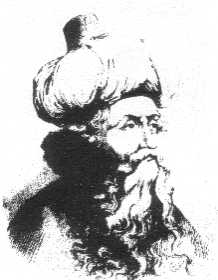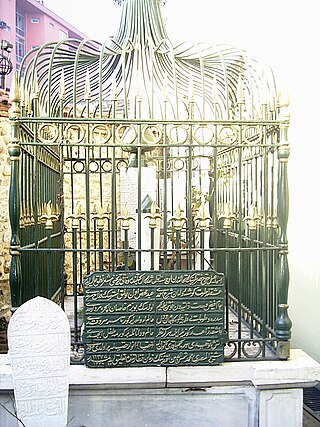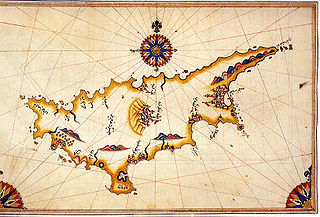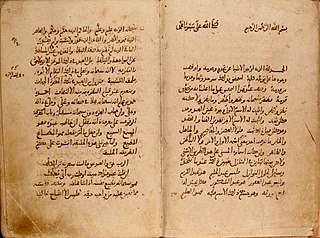
Ibn ʿArabī was an Arab Andalusian Muslim scholar, mystic, poet, and philosopher, extremely influential within Islamic thought. Out of the 850 works attributed to him, some 700 are authentic while over 400 are still extant. His cosmological teachings became the dominant worldview in many parts of the Muslim world.

Reshad Feild was an English mystic, author, spiritual teacher, and musician, who, as Tim Feild, originally came to prominence as a founder member of folk-pop group The Springfields. He was later the author of more than a dozen books about spirituality, and Sufism in particular.

Sufism is the mystical branch of Islam in which Muslims seek divine love and truth through direct personal experience of God. This mystic tradition within Islam developed in several stages of growth, emerging first in the form of early asceticism, based on the teachings of Hasan al-Basri, before entering the second stage of more classical mysticism of divine love, as promoted by al-Ghazali and Attar of Nishapur, and finally emerging in the institutionalized form of today's network of fraternal Sufi orders, based on Sufis such as Rumi and Yunus Emre. At its core, however, Sufism remains an individual mystic experience, and a Sufi can be characterized as one who seeks the annihilation of the ego in God.

In Islamic philosophy, Sufi metaphysics is centered on the concept of وحدة, waḥdah, 'unity' or توحيد, tawhid. Two main Sufi philosophies prevail on this topic. Waḥdat al-wujūd literally means "the Unity of Existence" or "the Unity of Being." Wujūd, meaning "existence" or "presence", here refers to God. On the other hand, waḥdat ash-shuhūd, meaning "Apparentism" or "Monotheism of Witness", holds that God and his creation are entirely separate.
Bulent Rauf was a Turkish-British mystic, spiritual teacher, translator and author. From 1945 to the early sixties, he was married to Princess Faiza, sister of King Farouk of Egypt.
Miguel Asín Palacios was a Spanish scholar of Islamic studies and the Arabic language, and a Roman Catholic priest. He is primarily known for suggesting Muslim sources for ideas and motifs present in Dante's Divine Comedy, which he discusses in his book La Escatología musulmana en la Divina Comedia (1919). He wrote on medieval Islam, extensively on al-Ghazali. A major book El Islam cristianizado (1931) presents a study of Sufism through the works of Muhyiddin ibn 'Arabi of Murcia in Andalusia. Asín also published other comparative articles regarding certain Islamic influences on Christianity and on mysticism in Spain.
Suha Taji-Farouki is a specialist in modern Islamic thought.
Luce López-Baralt is a prominent Puerto Rican scholar and essayist and a professor of Spanish and Comparative Literature at the University of Puerto Rico.

ʿIyāḍ ibn Mūsā (1083–1149), was a Maghrebi Sunni polymath and considered the leading scholar in maliki fiqh and hadith in his time. He was a prominent theologian, historian, poet, and genealogist.

Akbari Sufism or Akbarism is a branch of Sufi metaphysics based on the teachings of Ibn Arabi, an Andalusian Sufi who was a gnostic and philosopher. The word is derived from Ibn Arabi's nickname, "Shaykh al-Akbar," meaning "the greatest master." 'Akbariyya' or 'Akbaris' have never been used to indicate a specific Sufi group or society. It is now used to refer to all historical or contemporary Sufi metaphysicians and Sufis influenced by Ibn Arabi's doctrine of Wahdat al-Wujud. It is not to be confused with Al Akbariyya, a secret Sufi society founded by Swedish Sufi 'Abdu l-Hadi Aguéli.

Princess Faiza was an Egyptian princess and a member of the Muhammad Ali Dynasty.

İsmail Hakkı Bursevî was a 17th-century Ottoman Turkish Muslim scholar, a Jelveti Sufi author on mystical experience and the esoteric interpretation of the Quran; also a poet and musical composer. İsmail Hakkı Bursevî influenced many parts the Ottoman Empire but primarily Turkey. To this day he is revered as one of the Büyükler, the great saints of Anatolia.
Ibn Arabi and theoretical mysticism refers to a school of theoretical mystical thought which was developed and explored by Ibn Arabi. This thought movement also could be considered as the continuation of islamic philosophy.

Osman Fazli, was a Jelveti Sufi spiritual guide in 17th-century Ottoman Empire. He spent c.25 years teaching and preaching, and became head Sheikh of the order in Istanbul and led the studies, conversation, meditation, and dhikr. But when he was about 48 it was revealed to him that the Ottoman Empire would fall into ruin, and, although he was of reclusive temperament, felt the only way to care for its population was to be at the Sultan's court. There he was outspoken against many of the Grand Vizier's plans: that they would bring disaster and misfortune, and he was proven right. He spent some years at court but when he declared one Grand Vizier's plan as against the sharia and distorting the Quran, the only way the Vizier could silence him was with exile. Osman Fazli went into retreat but emerged with a different course of action: he was leading a band of Sufis towards the battlefront when he was arrested and exiled for good. Osman Fazli exemplifies the Jelveti way: that following union with Allah he returns and acts in the world. He is hushyar (awake).

Michel Chodkiewicz was a French scholar of Sufism, particularly the works of Ibn 'Arabi.
Caner Dagli is a Circassian-American Islamic scholar and associate professor of Religious Studies at the College of the Holy Cross in Worcester, Massachusetts.
Yousef Casewit is an American Quranic scholar and assistant professor of Qur'anic Studies at the University of Chicago.
Claude Addas is a French-Polish scholar of Islam who has made major contributions to the field of Ibn Arabi studies.

Eric Alexander Winkel is an Islamic scholar focusing on Ibn 'Arabi's teaching. He studied the Futuhat al-Makiyya for over 23 years. During his tenure as senior research fellow at the International Institute of Advanced Islamic Studies (IAIS) in Malaysia, he started to explore correlations between Islam and modern sciences and laid the groundwork for the connections between Ibn 'Arabi's vision and new directions in physics and mathematics. Since then he has been dedicating his life to translating the Futūḥāt al-Makkīyah into English.

The Konya Manuscript, MS Evkaf Muzesi 1845+ or Evkaf Muzesi 1845–1881 at Türk ve İslam Eserleri Müzesi, is an autograph manuscript of Ibn Arabi's magnum opus Al-Futuhat al-Makkiyya, completed in 37 volumes in 1238.










